- Home
- Robert Ervin Howard
Almuric
Almuric Read online
Almuric
Robert Ervin Howard
Almuric
by Robert Ervin Howard
Foreword
It was not my original intention ever to divulge the whereabouts of Esau Cairn, or the mystery surrounding him. My change of mind was brought about by Cairn himself, who retained a perhaps natural and human desire to give his strange story to the world which had disowned him and whose members can now never reach him. What he wishes to tell is his affair. One phase of my part of the transaction I refuse to divulge; I will not make public the means by which I transported Esau Cairn from his native Earth to a planet in a solar system undreamed of by even the wildest astronomical theorists. Nor will I divulge by what means I later achieved communication with him, and heard his story from his own lips, whispering ghostily across the cosmos.
Let me say that it was not premeditated. I stumbled upon the Great Secret quite by accident in the midst of a scientific experiment, and never thought of putting it to any practical use, until that night when Esau Cairn groped his way into my darkened observatory, a hunted man, with the blood of a human being on his hands. It was chance led him there, the blind instinct of the hunted thing to find a den wherein to turn at bay.
Let me state definitely and flatly, that, whatever the appearances against him, Esau Cairn is not, and was never, a criminal. In that specific case he was merely the pawn of a corrupt political machine which turned on him when he realized his position and refused to comply further with its demands. In general, the acts of his life which might suggest a violent and unruly nature simply sprang from his peculiar mental make-up.
Science is at last beginning to perceive that there is sound truth in the popular phrase, "born out of his time." Certain natures are attuned to certain phases or epochs of history, and these natures, when cast by chance into an age alien to their reactions and emotions, find difficulty in adapting themselves to their surroundings. It is but another example of nature's inscrutable laws, which sometimes are thrown out of stride by some cosmic friction or rift, and result in havoc to the individual and the mass.
Many men are born outside their century; Esau Cairn was born outside his epoch. Neither a moron nor a low-class primitive, possessing a mind well above the average, he was, nevertheless, distinctly out of place in the modern age. I never knew a man of intelligence so little fitted for adjustment in a machine-made civilization. (Let it be noted that I speak of him in the past tense; Esau Cairn lives, as far as the cosmos is concerned; as far as the earth is concerned, he is dead, for he will never again set foot upon it.)
He was of a restless mold, impatient of restraint and resentful of authority. Not by any means a bully, he at the same time refused to countenance what he considered to be the slightest infringement on his rights. He was primitive in his passions, with a gusty temper and a courage inferior to none on this planet. His life was a series of repressions. Even in athletic contests he was forced to hold himself in, lest he injure his opponents. Esau Cairn was, in short, a freak-a man whose physical body and mental bent leaned back to the primordial.
Born in the Southwest, of old frontier stock, he came of a race whose characteristics were inclined toward violence, and whose traditions were of war and feud and battle against man and nature. The mountain country in which he spent his boyhood carried out the tradition. Contest-physical contest-was the breath of life to him. Without it he was unstable and uncertain. Because of his peculiar physical make-up, full enjoyment in a legitimate way, in the ring or on the football field was denied him. His career as a football player was marked by crippling injuries received by men playing against him, and he was branded as an unnecessarily brutal man, who fought to maim his opponents rather than win games. This was unfair. The injuries were simply resultant from the use of his great strength, always so far superior to that of the men opposed to him. Cairn was not a great sluggish lethargic giant as so many powerful men are; he was vibrant with fierce life, ablaze with dynamic energy. Carried away by the lust of combat, he forgot to control his powers, and the result was broken limbs or fractured skulls for his opponents.
It was for this reason that he withdrew from college life, unsatisfied and embittered, and entered the professional ring. Again his fate dogged him. In his training-quarters, before he had had a single match, he almost fatally injured a sparring partner. Instantly the papers pounced upon the incident, and played it up beyond its natural proportions. As a result Cairn's license was revoked.
Bewildered, unsatisfied, he wandered over the world, a restless Hercules, seeking outlet for the immense vitality that surged tumultuously within him, searching vainly for some form of life wild and strenuous enough to satisfy his cravings, born in the dim red days of the world's youth.
Of the final burst of blind passion that banished him for ever from the life wherein he roamed, a stranger, I need say little. It was a nine-days' wonder, and the papers exploited it with screaming headlines. It was an old story-a rotten city government, a crooked political boss, a man chosen, unwittingly on his part, to be used as a tool and serve as a puppet.
Cairn, restless, weary of the monotony of a life for which he was unsuited, was an ideal tool-for a while. But Cairn was neither a criminal nor a fool. He understood their game quicker than they expected, and took a stand surprisingly firm to them, who did not know the real man.
Yet, even so, the result would not have been so violent if the man who had used and ruined Cairn had any real intelligence. Used to grinding men under his feet and seeing them cringe and beg for mercy, Boss Blaine could not understand that he was dealing with a man to whom his power and wealth meant nothing. Yet so schooled was Cairn to iron selfcontrol that it required first a gross insult, then an actual blow on the part of Blaine, to rouse him. Then for the first time in his life, his wild nature blazed into full being. All his thwarted and repressed life surged up behind the clenched fist that broke Blaine 's skull like an eggshell and stretched him lifeless on the floor, behind the desk from which he had for years ruled a whole district.
Cairn was no fool. With the red haze of fury fading from his glare, he realized that he could not hope to escape the vengeance of the machine that controlled the city. It was not because of fear that he fled Blaine 's house. It was simply because of his primitive instinct to find a more convenient place to turn at bay and fight out his death fight.
So it was that chance led him to my observatory.
He would have left, instantly, not wishing to embroil me in his trouble, but I persuaded him to remain and tell me his story. I had long expected some catastrophe of the sort. That he had repressed himself as long as he did, shows something of his iron character. His nature was as wild and untamed as that of a maned lion.
He had no plan-he simply intended to fortify himself somewhere and fight it out with the police until he was riddled with lead.
I at first agreed with him, seeing no better alternative. I was not so naive as to believe he had any chance in the courts with the evidence that would be presented against him. Then a sudden thought occurred to me, so fantastic and alien, and yet so logical, that I instantly propounded it to my companion. I told him of the Great Secret, and gave him proof of its possibilities.
In short, I urged him to take the chance of a flight through space, rather than meet the certain death that awaited him.
And he agreed. There was no place in the universe which would support human life. But I had looked beyond the knowledge of men, in universes beyond universes. And I chose the only planet I knew on which a human being could exist-the wild, primitive, and strange planet I named .
Cairn understood the risks and uncertainties as well as I. But he was utterly fearless-and the thing was done. Esau Cairn left the planet of his birth, for a world swimm
ing afar in space, alien, aloof, strange.
Chapter 1
The Transition was so swift and brief, that it seemed less than a tick of time lay between the moment I placed myself in Professor Hildebrand's strange machine, and the instant when I found myself standing upright in the clear sunlight that flooded a broad plain. I could not doubt that I had indeed been transported to another world. The landscape was not so grotesque and fantastic as I might have supposed, but it was indisputably alien to anything existing on the Earth.
But before I gave much heed to my surroundings, I examined my own person to learn if I had survived that awful flight without injury. Apparently I had. My various parts functioned with their accustomed vigor. But I was naked. Hildebrand had told me that inorganic substance could not survive the transmutation. Only vibrant, living matter could pass unchanged through the unthinkable gulfs which lie between the planets. I was grateful that I had not fallen into a land of ice and snow. The plain seemed filled with a lazy summerlike heat. The warmth of the sun was pleasant on my bare limbs.
On every side stretched away a vast level plain, thickly grown with short green grass. In the distance this grass attained a greater height, and through it I caught the glint of water. Here and there throughout the plain this phenomenon was repeated, and I traced the meandering course of several rivers, apparently of no great width. Black dots moved through the grass near the rivers, but their nature I could not determine. However, it was quite evident that my lot had not been cast on an uninhabited planet, though I could not guess the nature of the inhabitants. My imagination peopled the distances with nightmare shapes.
It is an awesome sensation to be suddenly hurled from one's native world into a new strange alien sphere. To say that I was not appalled at the prospect, that I did not shrink and shudder in spite of the peaceful quiet of my environs, would be hypocrisy. I, who had never known fear, was transformed into a mass of quivering, cowering nerves, starting at my own shadow. It was that man's utter helplessness was borne in upon me, and my mighty frame and massive thews seemed frail and brittle as the body of a child. How could I pit them against an unknown world? In that instant I would gladly have returned to Earth and the gallows that awaited me, rather than face the nameless terrors with which imagination peopled my new-found world. But I was soon to learn that those thews I now despised were capable of carrying me through greater perils than I dreamed.
A slight sound behind me brought me around to stare amazedly at the first inhabitant of I was to encounter. And the sight, awesome and menacing as it was, yet drove the ice from my veins and brought back some of my dwindling courage. The tangible and material can never be as grisly as the unknown, however perilous.
At my first startled glance I thought it was a gorilla which stood before me. Even with the thought I realized that it was a man, but such a man as neither I nor any other Earthman had ever looked upon.
He was not much taller than I, but broader and heavier, with a great spread of shoulders, and thick limbs knotted with muscles. He wore a loincloth of some silklike material girdled with a broad belt which supported a long knife in a leather sheath. High-strapped sandals were on his feet. These details I took in at a glance, my attention being instantly fixed in fascination on his face.
Such a countenance it is difficult to imagine or describe. The head was set squarely between the massive shoulders, the neck so squat as to be scarcely apparent. The jaw was square and powerful, and as the wide thin lips lifted in a snarl, I glimpsed brutal tusk-like teeth. A short bristly beard masked the jaw, set off by fierce, up-curving mustaches. The nose was almost rudimentary, with wide flaring nostrils. The eyes were small, bloodshot, and an icy gray in color. From the thick black brows the forehead, low and receding, sloped back into a tangle of coarse, bushy hair. The ears were small and very close-set.
The mane and beard were very blue-black, and the creature's limbs and body were almost covered with hair of the same hue. He was not, indeed, as hairy as an ape, but he was hairier than any human being I had ever seen.
I instantly realized that the being, hostile or not, was a formidable figure. He fairly emanated strength-hard, raw, brutal power. There was not an ounce of surplus flesh on him. His frame was massive, with heavy bones. His hairy skin rippled with muscles that looked iron-hard. Yet it was not altogether his body that spoke of dangerous power. His look, his carriage, his whole manner reflected a terrible physical might backed by a cruel and implacable mind. As I met the blaze of his bloodshot eyes, I felt a wave of corresponding anger. The stranger's attitude was arrogant and provocative beyond description. I felt my muscles tense and harden instinctively.
But for an instant my resentment was submerged by the amazement with which I heard him speak in perfect English!
"Thak! What manner of man are you?"
His voice was harsh, grating and insulting. There was nothing subdued or restrained about him. Here were the naked primitive instincts and manners, unmodified. Again I felt the old red fury rising in me, but I fought it down.
"I am Esau Cairn," I answered shortly, and halted, at a loss how to explain my presence on his planet.
His arrogant eyes roved contemptuously over my hairless limbs and smooth face, and when he spoke, it was with unbearable scorn.
"By Thak, are you a man or a woman?"
My answer was a smash of my clenched fist that sent him rolling on the sward.
The act was instinctive. Again my primitive wrath had betrayed me. But I had no time for self-reproach. With a scream of bestial rage my enemy sprang up and rushed at me, roaring and frothing. I met him breast to breast, as reckless in my wrath as he, and in an instant was fighting for my life.
I, who had always had to restrain and hold down my strength lest I injure my fellow men, for the first time in my life found myself in the clutches of a man stronger than myself. This I realized in the first instant of impact, and it was only by the most desperate efforts that I fought clear of his crushing embrace.
The fight was short and deadly. The only thing that saved me was the fact that my antagonist knew nothing of boxing. He could-and did-strike powerful blows with his clenched fists, but they were clumsy, ill-timed and erratic. Thrice I mauled my way out of grapples that would have ended with the snapping of my spine. He had no knack of avoiding blows; no man on Earth could have survived the terrible battering I gave him. Yet he incessantly surged in on me, his mighty hands spread to drag me down. His nails were almost like talons, and I was quickly bleeding from a score of places where they had torn the skin.
Why he did not draw his dagger I could not understand, unless it was because he considered himself capable of crushing me with his bare hands-which proved to be the case. At last, half blinded by my smashes, blood gushing from his split ears and splintered teeth, he did reach for his weapon, and the move won the fight for me.
Breaking out of a half-clinch, he straightened out of his defensive crouch and drew his dagger. And as he did so, I hooked my left into his belly with all the might of my heavy shoulders and powerfully driving legs behind it. The breath went out of him in an explosive gasp, and my fist sank to the wrist in his belly. He swayed, his mouth flying open, and I smashed my right to his sagging jaw. The punch started at my hip, and carried every ounce of my weight and strength. He went down like a slaughtered ox and lay without twitching, blood spreading out over his beard. That last smash had torn his lip open from the corner of his mouth to the rim of his chin, and must surely have fractured his jawbone as well.
Panting from the fury of the bout, my muscles aching from his crushing grasp, I worked my raw, skinned knuckles, and stared down at my victim, wondering if I had sealed my doom. Surely, I could expect nothing now but hostility from the people of . Well, I thought, as well be hanged for a sheep as a goat. Stooping, I despoiled my adversary of his single garment, belt and weapon, and transferred them to my own frame. This done, I felt some slight renewal of confidence. At least I was partly clothed and armed.
> I examined the dagger with much interest. A more murderous weapon I have never seen. The blade was perhaps nineteen inches in length, double-edged, and sharp as a razor. It was broad at the haft, tapering to a diamond point. The guard and pommel were of silver, the hilt covered with a substance somewhat like shagreen. The blade was indisputably steel, but of a quality I had never before encountered. The whole was a triumph of the weapon-maker's art, and seemed to indicate a high order of culture.
From my admiration of my newly acquired weapon, I turned again to my victim, who was beginning to show signs of returning consciousness. Instinct caused me to sweep the grasslands, and in the distance, to the south, I saw a group of figures moving toward me. They were surely men, and armed men. I caught the flash of the sunlight on steel. Perhaps they were of the tribe of my adversary. If they found me standing over their senseless comrade, wearing the spoils of conquest, their attitude toward me was not hard to visualize.
I cast my eyes about for some avenue of escape or refuge, and saw that the plain, some distance away, ran up into low green-clad foothills. Beyond these in turn, I saw larger hills, marching up and up in serried ranges. Another glance showed the distant figures to have vanished among the tall grass along one of the river courses, which they must cross before they reached the spot where I stood.
Waiting for no more, I turned and ran swiftly toward the hills. I did not lessen my pace until I reached the foot of the first foothills, where I ventured to look back, my breath coming in gasps, and my heart pounding suffocatingly from my exertions. I could see my antagonist, a small shape in the vastness of the plain. Further on, the group I was seeking to avoid had come into the open and were hastening toward him.
I hurried up the low slope, drenched with sweat and trembling with fatigue. At the crest I looked back once more, to see the figures clustered about my vanquished opponent. Then I went down the opposite slope quickly, and saw them no more.

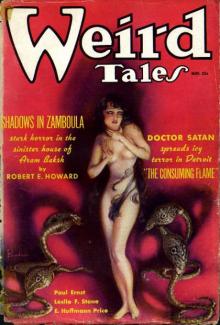 Shadows in Zamboula (conan the barbarian)
Shadows in Zamboula (conan the barbarian)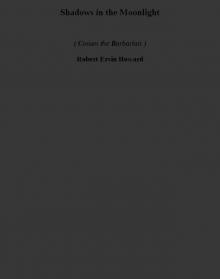 Shadows in the Moonlight (conan the barbarian)
Shadows in the Moonlight (conan the barbarian)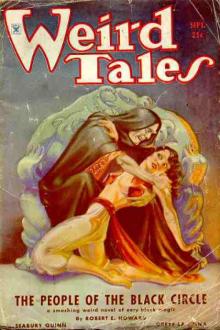 The People of the Black Circle (conan the barbarian)
The People of the Black Circle (conan the barbarian)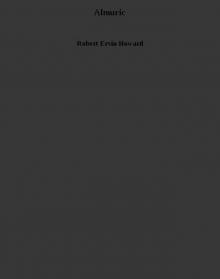 Almuric
Almuric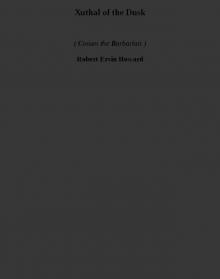 Xuthal of the Dusk (conan the barbarian)
Xuthal of the Dusk (conan the barbarian)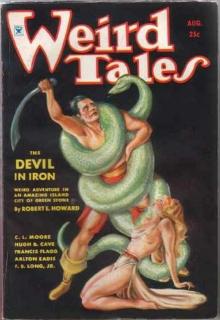 The Devil in Iron (conan the barbarian)
The Devil in Iron (conan the barbarian)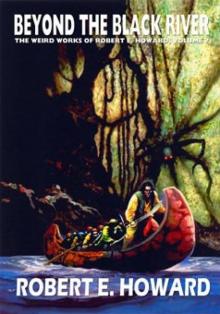 Beyond the Black River (conan the warrior)
Beyond the Black River (conan the warrior)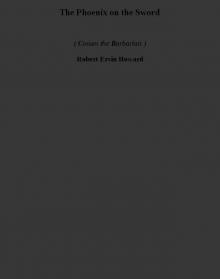 The Phoenix on the Sword (conan the barbarian)
The Phoenix on the Sword (conan the barbarian)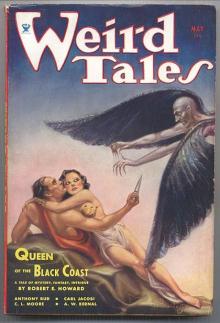 Queen of the Black Coast
Queen of the Black Coast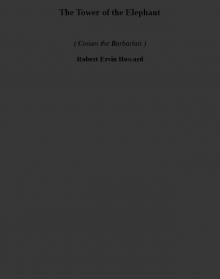 The Tower of the Elephant (conan the barbarian)
The Tower of the Elephant (conan the barbarian)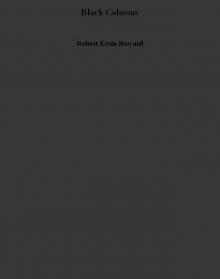 Black Colossus
Black Colossus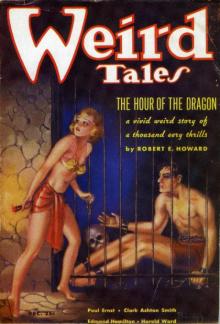 The Hour of the Dragon (conan the barbarian)
The Hour of the Dragon (conan the barbarian)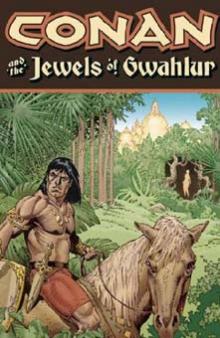 Jewels of Gwahlur (conan the warrior)
Jewels of Gwahlur (conan the warrior)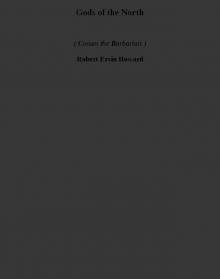 Gods of the North (conan the barbarian)
Gods of the North (conan the barbarian)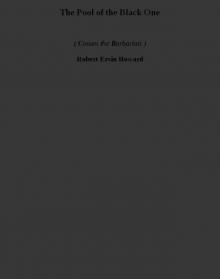 The Pool of the Black One (conan the barbarian)
The Pool of the Black One (conan the barbarian) A Witch Shall Be Born
A Witch Shall Be Born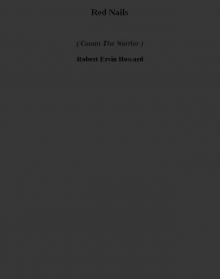 Red Nails (conan the warrior)
Red Nails (conan the warrior)